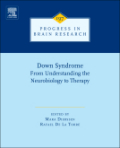
Down syndrome: from understanding the neurobiology to therapy
Dierssen, Mara
Torre Fornell, Rafael de la
Down syndrome (DS) is the most common example of neurogenetic aneuploid disorder leading to mental retardation. In most cases, DS results from an extra copy of chromosome 21 (HSA21) producing deregulated gene expression in brain thatgives raise to subnormal intellectual functioning. The topic of this volume is of broad interest for the neuroscience community, because it tackles the concept of neurogenomics, that is, how the genome as a whole contributes to a neurodevelopmental cognitive disorders, such as DS, and thus to the development, structure and function of the nervous system. This volume of Progress in BrainResearch discusses comparative genomics, gene expression atlases of the brain, network genetics, engineered mouse models and applications to human and mouse behavioral and cognitive phenotypes. It brings together scientists of diverse backgrounds, by facilitating the integration of research directed at different levels of biological organization, and by highlighting translational research and the application of the existing scientific knowledge to develop improved DS treatments and cures. Leading authors review the state-of-the-art in their field of investigation and provide their views and perspectives for future researchChapters are extensively referenced to provide readers with a comprehensive list of resources on the topics coveredAll chapters include comprehensivebackground information and are written in a clear form that is also accessible to the non-specialist
- ISBN: 978-0-444-54299-1
- Editorial: Elsevier Science
- Encuadernacion: Cartoné
- Páginas: 400
- Fecha Publicación: 01/05/2012
- Nº Volúmenes: 1
- Idioma: Inglés
